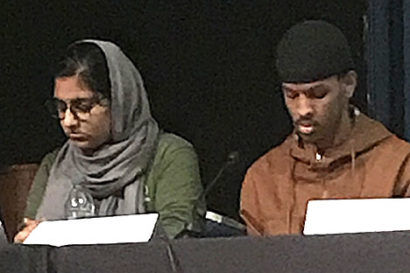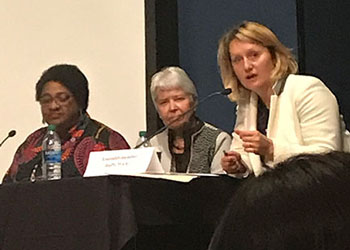California officials, students rate inclusiveness on college campuses
While students acknowledge some progress has been made, they recount ongoing experiences with discrimination, social isolation and heavy-handed policing
November 6, 2019

UC Berkeley students Sadia Khan, left, and Ahmad Mahmoud testify at a legislative hearing regarding the climate at California college campuses. (UC Berkeley photo)
Five years after the California Legislature issued a report to promote a safer and more inclusive public college experience, students, higher education officials and diversity experts gathered at a legislative hearing in Berkeley on Tuesday to share their perspectives on what’s working and what’s not.
While student representatives from UC Berkeley and other state colleges acknowledged steps taken to provide “safe spaces” at their schools for underrepresented minorities, several recounted ongoing experiences with discrimination, microaggression, social isolation and heavy-handed policing.
About 100 people, most of them students of color, attended the hearing at Berkeley’s Anna Head Alumnae Hall. The hearing was presided over by California Assembly Member Shirley Weber (D-San Diego).
Weber, a San Diego State professor emerita of Africana studies, is chair of the Assembly’s Select Committee on Campus Climate. She noted the hearing was “not designed to lambaste any particular campus.”
“Today is a chance to learn about the work we’ve done nationally about campus climate, hear students’ voices and how California’s higher education sectors are responding,” she said.
In her welcome remarks, Berkeley Chancellor Carol Christ acknowledged that, while gains have been made, more work must be done to achieve campuswide equity.
We know that when students feel safe and welcomed, they do better.”
– Ahmad Mahmoud, UC Berkeley second-year
“Although I believe we are making progress on these issues, we must also acknowledge that many challenges persist after years of systemic marginalization,” she said.
Former Speaker of the Assembly John Pérez, now chair of the UC Regents, established the Select Committee on Campus Climate in 2014 in response to the hate crimes perpetrated in 2013 against an African American student at San Jose State University. Campus climate is defined as a measure of an individual’s experience within a learning environment.
The committee has since convened state and public higher education officials at public hearings to discuss how they’re tackling conflicts regarding gender identity, race, ethnicity, sexual orientation, national origin, religion, disability and even homelessness and food insecurity on campuses.
At Tuesday’s hearing, Weber, who is known as a firebrand for her commitment to racial justice and social mobility, reviewed how California’s public higher education landscape has changed in the last half-decade and called on equity policies to keep pace.
“As we continue to grow as a system, we become increasingly diverse … our students need to feel safe on campus,” said Weber. “Unfortunately, symbols of hate, offensive hate speech and acts of intimidation have continued to be on a steady incline over the past four years.”
She cited an Anti-Defamation League report showing a 77% rise across the nation in the distribution of white supremacist propaganda on college campuses during the 2017-18 academic year.

Assembly Member Buffy Wicks, right, with UC Berkeley Chancellor Carol Christ, middle, and Assembly Member Shirley Weber at hearing on campus climate. (UC Berkeley photo)
Assembly Member Buffy Wicks (D-Oakland), who also attended the hearing, blamed a rise in bigotry on the tone of the current U.S. presidency and called for more public forums to examine “uncomfortable truths.”
In his testimony, Ahmad Mahmoud, a second-year Berkeley student and president of the campus’s NAACP chapter, recalled feeling ostracized for being black and Muslim when he first arrived at Berkeley and for what he’s had to overcome to succeed.
“We know that when students feel safe and welcomed, they do better,” Mahmoud said.
Representatives from the University of California, California State University and the California Community Colleges gave an accounting of the steps their institutions have taken to make their campuses safer and more welcoming to students of all backgrounds.
Oscar Dubón, Berkeley’s vice chancellor for equity and inclusion, credited last year’s UC-wide campus climate survey for providing a more accurate picture of exclusionary behavior experienced across the campus and said more surveys are underway.
As for remedies, he cited the African American Initiative and the Fannie Lou Hamer Black Resource Center, which provide support services to black students, as well as Berkeley’s efforts to secure the designation of a Hispanic Serving Institution, which will require recruiting and serving Latinx students and other underrepresented minorities.
During public comments, several students blamed Proposition 209 for the low numbers of underrepresented minorities on campuses. The California law, approved by voters in 1996, bans consideration of race, ethnicity and gender in admissions in public higher education.
“I’m asking for our university leadership to not just support (the repeal of Proposition 209), but to actively, loudly, demand it, because it’s a critical part of solving our climate crisis on campus,” said Varsha Sarveshwar, president of the University of California Student Association and vice president of external affairs for Berkeley’s ASUC.